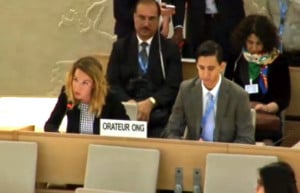
ICT’s Elena Gaita making a Statement on Tibet on behalf of the Helsinki Foundation for Human Rights at the UN Human Rights Council session in Geneva on June 18, 2015.
Ms. Gaita, who is the Policy and Advocacy Officer at the International Campaign for Tibet office in Brussels, said in her statement, “In the current political climate in Tibetan areas of the PRC, almost any expression of cultural or national identity can be characterized as ‘splittist’ and ‘criminal’ with harsh punishments imposed. Control and surveillance, online and offline, are part of daily life.”
“We call upon the Human Rights Council, of which the Peoples’ Republic of China is a member, to ensure freedom of expression and opinion in Tibet, in particular with respect to the upcoming birthday of the 14th Dalai Lama,” she added.
Following is the full text of her statement.
GENERAL ASSEMBLY
Human Rights Council
Twenty-ninth session
June 18, 2015
Item 3: Interactive Dialogue – Report of the Special Rapporteur on the promotion and protection of the right to freedom of opinion and expression
Statement delivered by Ms. Elena Gaita on behalf of Helsinki Foundation for Human Rights (HFHR)
Mr. President,
We wish to thank the Special Rapporteur on the promotion and protection of the right to freedom of opinion and expression for his report. In particular, we commend the Special Rapporteur for stressing the importance of the right to freely express opinions in a modern communications and security environment.
In the current political climate in Tibetan areas of the PRC, almost any expression of cultural or national identity can be characterized as ‘splittist’ and ‘criminal’ with harsh punishments imposed. Control and surveillance, online and offline, are part of daily life.
It is disturbing that the People’s Republic of China, despite international standards and contravening relevant clauses of its own constitution, is aiming to promulgate laws that will further constrict space for expression.
New draft laws on overseas NGOs, national security and counter-terrorism that are in the final stages outline a ‘hyper-securitized’ framework of the Party state with vast discretionary powers. The conflation of “terrorism” with religious “extremism” in the laws gives scope for the penalization of almost any peaceful expression of Tibetan culture, religion or identity that may differ from those of the state, or any criticism of ethnic or religious policies. It also broadens the reach of the state into lay society, for instance requiring the strengthening of “counter-terrorism education” in schools.
Mr President, we believe these measures are deeply disturbing and counter-productive. We also wish to share our concerns about the possibility of the Chinese Government clamping down on Tibetan expression of reverence during the upcoming 80th birthday of the 14th Dalai Lama on July 6, 2015. Previously, Chinese armed police have violently interfered with peaceful celebrations of the Dalai Lama’s birthday. Two Tibetans were shot in the head and at least eight others seriously injured after police opened fire at unarmed Tibetans who had gathered for a picnic and to offer prayers at a sacred mountain in Nyitso, Tawu, on July 6, 2013.
We call upon the Human Rights Council, of which the Peoples’ Republic of China is a member, to ensure freedom of expression and opinion in Tibet, in particular with respect to the upcoming birthday of the 14th Dalai Lama.
Thank you, Mr. President.

